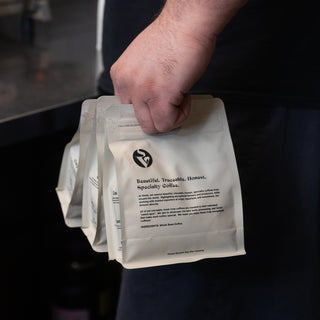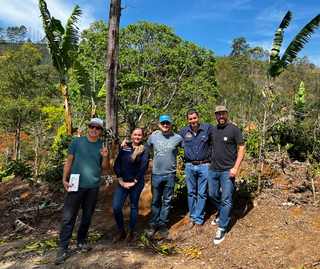Hello! I'm Jerad, the founder of Vesta Coffee Roasters. Last month I was able to travel to El Salvador and Costa Rica to reconnect and meet some of our longtime coffee supplier partners. We don’t get to make these trips very often so it was definitely a treat! Not being able to visit our farmers since pre-Covid, this trip was a good way for us to reconnect with the source of our coffee, with the producers, the exporters, and the whole team along the way. There are a ton of steps that go into getting coffee from a producing country into the US, to our roastery and then to you. We think having our hands in each one of those steps helps us continue to learn, helps us be better as a business, and helps us be better at communication. Ultimately, it helps us provide a fresher and tastier coffee to you.
Costa Rica

My first trip was to Costa Rica. There, Carlos Montero, from the Don Eli Mill was gracious enough to let us crash at Finca Temana in San Marcos de Tarrazu. We met Carlos and his family a few years back through Perry at Selva coffee. We’ve been working with Selva for the last few years, they concentrate in the Tarrazu region and work directly with a lot of farmers in the area. Perry and Nela from Selva, live there permanently, so they’ve built up some great relationships with the community and with the farmers in that area. Nela's brother Jacob, and father Carlos, run their family mill, Don Eli, in San Marcos de Tarrazu. For us, they've helped organize and filter lots of coffee to what we're looking for, saving us time and zeroing in on coffees that are relevant for Vesta Coffee Roasters. This year, we got to meet with farmers that we've been buying coffees from for the last 5 years. A truly special experience.

Minor Jimenez
One of our largest volume coffees that we purchase is a coffee from a farmer named, Minor Jiménez. Minor's coffees are doing really well for us, it’s a large portion of our cold brew, and we also sell as a single origin. It was great to meet him and his family, and see the farm, his growth, and how his attention to detail has been shown in the cup. Minor’s already fantastic coffees keep getting better and better, and it’s because he has almost surgical attention to detail, mill cleanliness, and sorting.

One of the greatest details that Minor puts in is the drying. He dries on patio and raised bed and then finishes in mechanical dryers. This drying process is something that we see a lot of in Colombia, and I firmly believe that this form of drying is great for coffees. And, if you're able to regulate that process, it helps a farmer use less space, and deal with the ebbs and flows of the harvest.
Minor's three fincas are over 100 hectares, and throughout the year he'll hire over 200 pickers, and 25 full time employees. One of the great and progressive things that Costa Rica has implemented is a minimum payment amount that the pickets can make, so Minor is able to hire the same families year-after-year because he pays a higher wage than his neighbors.

This year Vesta will be bringing in one of his washed coffees in place of the honey process we normally buy. We are excited to see what washed coffees in Costa Rica can be! Recently, many coffees coming out of Costa Rica are honey, or natural process, as it uses much less water to process, but also because it helped farmers fetch a better price for their coffees. We believe there are regions in Costa Rica that can still produce very high scoring washed process coffees. And we believe this is a more accurate reflection of terroir. Thankfully Minor has the trust, and confidence to process coffees in that way. And we hope to continue working with him for years to come.
Javier Solis
While in San Marcos, I was also able to finally meet Javier Solis. Not the singer and actor from Mexico, but a super creative and well studied science teacher that has slowly been taking over the family farm, El Cedral, in the Dota Valley. Like the singer though, Javier Solis has been producing some artfully balanced and fruit forward anaerobic coffees that sing beautifully!

Cedral means cedar tree in Spanish. This area was overrun by cedar trees in the past, but in the mid 1900s a large company from Spain came into the area and cut down the area where the farm resides today. The micro climate coupled with the habitat that Alfonso has created by planting various other plants in order to produce excellent coffee is world class. High altitude, great cloud cover, strong sun rays, plenty of wind movement, and frequent rains lend well to the young catuai plants (only 7 years old!) growing in the fertile soil of the Dota Valley.
Aside from having a very biodiverse farm they do many things in the quest to manage the farm sustainably. They use the spent cascara from processing on their plants not only as fertilizer but also to maintain moisture in the soil.
The most mature cherries are used for the natural anaerobic process. The fruit is passed through a floating system which removes inferior product. Then, Javier places the coffee in a sealed, plastic tank in an area with low temperature and little to no exposure to sun. The fruit is allowed to ferment in this controlled environment anywhere between 4 or 5 days, before being taken out in order to dry. Only once reaching a ph of 4.5. Then moved to a "pre-drying" in patios for about 8 days where the cherries are moved only a few times during sun-light hours and then it is dried in the greenhouse for an additional 15 days where the coffees is turned frequently - about every hour.
All of this skill and meticulous attention to detail produces one of highest quality anaerobics we have ever tasted.

While we were visiting the farm Javier brought some Jagermister and Tequila Rose. The group then hung out, told stories and watched the sunset from his viewing deck above the farm.
El Salvador
Angel's Mountain
Alright, on to El Salvador! This is the first time anyone from the Vesta team has been able to travel to El Salvador. Which is crazy because we've been using an El Salvadorian coffee from Angel's Mountain since the inception of Vesta! We used to buy it through an importer, Bodhi Leaf, and it's kinda wild how these connections were made. There was a year where Bodhi, for whatever reason, didn't import the coffee. It's a huge part of our espresso, the Goose Bumps blend, so we were really struggling to find this coffee. We had no idea what to do, but we knew the farmer and his daughter's name. With no other way to contact them, we reached out to our friend Jeff Courson from Ally Coffee. We hadn't really purchased from Ally Coffee, but they're a great export and import partner concentrating a lot in Brazil and also doing great work in Colombia. Jeff, being the great "ally" he is (pun intended), was able to connect us with the farmer!

Tito ("Angel")
Tito and Barbie from Angel's Mountain really stoked that we reached out, and we were able to secure their coffee for that third year. It’s now our sixth year of buying their coffees! Tito runs six separate but nearby farms. All separated by variety, along the tops of the same valley just outside Comasagua, El Salvador in the La Libertad Dept.

Tito's family has been living in the area for four generations, and he is a third generation coffee farmer. Much of El Salvador is sadly being taken over by Roya, (a very powerful fungus that causes coffee leaf rust) but Tito is putting in a lot of effort to find Roya-resistant varieties that are going to help him to combat the issue.
What I enjoy most about traveling to origin is being able to connect with producers on a human level, more than just Coffee. I love learning about culture and family histories. Having a beer, aguardente, or lunch with real folks and talking about weather or the local politics.

Tito was a super-gracious host, and we were able to have some time to eat lunch, talk about the political climate in El Salvador, and hear some stories about his bohemian grandfather and italian grandmother. To this day, Tito says people in the town of Comasagua still stop him to tell him stories about his grandfather.
Thank you for making it to the end of my Centro Americano coffee trip recap. These coffees, these people, these stories are what keep us excited to do what we do. I truly hope it shows in the cup!
Onward!



